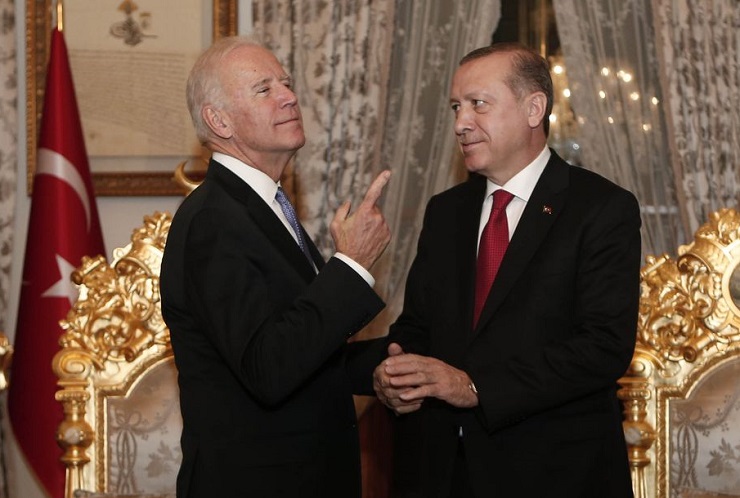The West, namely the US and EU, appear to have designed a joint approach to clip Turkey’s wings in order to dent its ability to stretch itself beyond its territorial boundaries and act as big power, competing the West itself. Turley, under Erdogan, has been able to stretch itself to Libya in north Africa, and Azerbaijan in the Caucasus. It remains involved in Syria [against the US] and its drilling projects in East Mediterranean have put it at odds with other EU and NATO member states, including France; hence, an almost simultaneous announcement of sanctions by the EU and the US, targeting Turkey’s defense and economy to ‘teach’ it a lesson. While it remains that these sanctions may push Turley further towards Russia and even China, there is no gainsaying that Turkey’s pursuit of ‘Neo-Ottoaminst’ policies and its strong desire to place itself as a strong regional power with global outreach have made it a major headache for Europe and the US. Turkey’s relations with the US and the EU – effectively with NATO as well – are on the verge of a collapse.
On Friday December 11, EU leaders agreed to impose sanctions on an unspecified number of Turkish officials and entities involved in gas drilling in Cypriot-claimed waters. While France, Greece and Cyprus were looking for tougher sanctions— trade tariffs and an arms embargo—the European Council decided to consult the in-coming Biden administration with regards to the full range of sanctions.
The US, on other hand, has already decided to sanction Turkey’s Presidency of Defence Industry and Undersecretary for Defence Industries Ismail Demir. The US sanctions are a response to Turkey’s purchase of Russian S-400 missile system. The US sanctions would be implemented under the Countering America’s Adversaries Through Sanctions Act (CAATSA), a sweeping 2017 law that allows for financial penalties on countries that purchase Russian military hardware. While these sanctions are a doing of an out-going administration, this is most likely to be seen as a welcome move by the president-elect, who sees Erdogan as an ‘autocrat.’
While Turkey and the EU have a history of bad relations, recent tensions need to be analyzed against the backdrop of a subtle yet significant change in Turkey’s foreign policy approach. Turkey, under Erdogan, seems to have concluded that independently deploying hard power abroad serves them better than aligning with the enfeebled power of the NATO. This calculation has produced a major shift in the way Turkey has started aggressively deploying its forces in Libya, Syria, Iraq, Azerbaijan and elsewhere.
While Erdogan’s external agenda serves his internal political interests as well, it remains that by inserting itself directly in conflict zones, Turkey is not only pushing to add more to its diplomatic clout, but increasingly placing itself as a hegemon that has a right and the requisite military power to mediate and manage conflicts. For the Erdogan regime, this is not mere adventurism. For them, Turkey’s increasing military presence on foreign soils is a national milestone that they have covered to realize their ultimate objective: Turkey’s reincarnation as Ottoman empire. Although this empire cannot come into being physically, Turkey, by extending its own physical outreach, is carving out a space where it has enough influence to act as a new-Ottoman empire of sorts.
The US and the EU seem determined to limit Turkey’s ambitions in order to prevent its emergence as yet another independent player in a world that, with the massive rise of China and Russia, has largely turned multi-polar. An assertive Turkey, close to the EU, is a nuisance that the EU doesn’t want to handle.
The EU-US narrative on Turkey is very similar to how the West has always projected Russia. Erdogan, like Russia’s Vladimir Putin, is often presented and demonized as an outcast and authoritarian ruler who suppresses dissent and is unwilling to give up political power. What makes Turkey different from Russia is that Turkey is formally a NATO ally, although it hardly seems to act like one. Despite being a NATO ally, Turkey buys Russia’s advanced ground-to-air S-400 missiles; it challenges the US and then takes steps to cosy up to its president. Erdogan insults European leaders, but never quite blows up his country’s European Union membership negotiations; he goads Greece and Cyprus over Eastern Mediterranean maritime boundaries and then calls for dialogue.
Turkey is, therefore, a nuisance that is causing both the US and the EU a lot of trouble. For the post-Trump era transatlantic alliance, a major challenge, therefore, is going to be to rein in the ‘autocrat’ through a wide range of sanctions and/or a calculated distance that could come in the form of substantially reduced military and intelligence cooperation, working around Turkey more explicitly at NATO, preparing to move some US strategic assets from Incirlik to Greece (already discreetly underway), building ties with Turkish opposition leaders, discouraging tourism through negative travel advisories and weighing on Ankara’s access to Western financial markets.
Again, this is a very familiar and typical Western approach to countries that challenge their hegemony. The West has been using a varying mix of this policy towards Russia for many years. As such, now that the West is putting Turkey in the same basket as Russia, the two countries might find an additional ground to expand their alliance. This will, very much like Turkey’s purchase of Russian S-400 system, cause further distance between the West and Turkey.
Salman Rafi Sheikh, research-analyst of International Relations and Pakistan’s foreign and domestic affairs, exclusively for the online magazine “New Eastern Outlook”.

